DCPA NEWS CENTER
Enjoy the best stories and perspectives from the theatre world today.
Enjoy the best stories and perspectives from the theatre world today.
Acclaimed director Diane Paulus’ personal mantra as an artist is to always expand the boundaries of theater – or why even bother?
She did that when she reimagined the classic Broadway musicals Hair, Porgy & Bess and Pippin; the films Finding Neverland and Waitress, and even Alanis Morissette’s platinum-selling album Jagged Little Pill. And she’s done it again with a revolutionary new version of the Revolutionary War musical 1776.
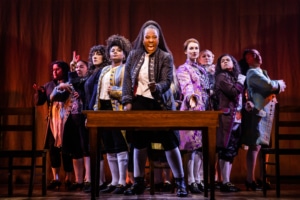
The company of Roundabout Theatre Company’s 1776. Photo by Joan Marcus, 2022
Instead of telling the story of the founding fathers with a cast of mostly white men, as first conceived in 1969, Paulus and co-director Jeffrey L. Page’s more representative modern ensemble is made up entirely of multi-racial actors who are female, nonbinary and trans.
None of whom would have been allowed to audition for the show’s Broadway premiere 54 years ago. More meaningfully, none of whom were given the slightest consideration by the crafters of the Declaration of Independence 247 years ago. Except in one important, horrific way.
For all its talk about all men being “created equal,” the Declaration of Independence deprived roughly one-fifth of the population of their own inalienable right to liberty. Many of the colonists who sought freedom from British tyranny themselves bought and sold human beings through slavery. But you already knew that, right?
What you might not know – Paulus and Page did not, before taking on 1776 – is that in an early draft of the Declaration, Thomas Jefferson condemned slavery as “one of the many evils foisted upon the colonies by the British crown.” He called it “piratical warfare” and an “assemblage of horrors.” (Yes, the same Jefferson who owned more than 600 enslaved people in his lifetime.)
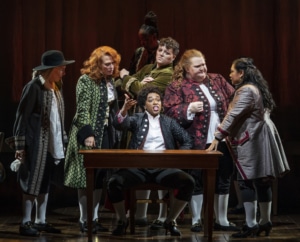
The company of Roundabout Theatre Company’s 1776. Photo by Joan Marcus, 2022
As the fledgling republic teetered on the brink of collapse, the Declaration’s authors caved to the Southern states on slavery, and Jefferson’s passage was cut for political expediency.
“So while Jefferson is credited with infusing the Declaration with enlightened ideals of freedom and equality, the nation’s founding document — its moral mission statement — would remain forever silent on the issue of slavery,” Yohuru Williams wrote for history.com. Thus ensuring the struggle over basic human and civil rights would continue for centuries.
Discovering Peter Stone and Sherman Edwards’ time-capsule musical (some see it as a precursor to Lin-Manuel Miranda’s Hamilton) was an opportunity for Paulus to reflect on her own journey with learning American history.
“Certainly we all studied the Declaration of Independence in high school, but the slavery aspect is one piece of the history I was not familiar with before I sat down and read 1776,” she said. “When I read that in the play, I thought, ‘Wait, did this really happen?’”
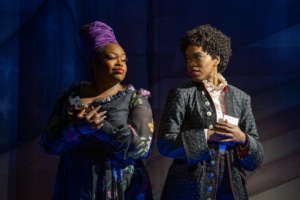
Allyson Kaye Daniel, Kristolyn Lloyd in Roundabout Theatre Company’s 1776. Photo by Joan Marcus, 2022
Paulus now looks at the Declaration as a deeply aspirational divorce decree and its authors as heroic radicals who were attempting to found a country on a noble idea. And they were risking their lives to do it.
And yet …
“Part of the study for me was not only to understand the stakes for these historical figures, but also to understand how we reckon with the compromises that were made, and who was left out,” said Paulus.
She believes today’s 1776 audiences will see a production that reflects the change that we seem to be collectively aspiring to, both in America and inside the American theater. “You will be looking at a cast of humans who would have had no voice in the history-making that this musical depicts,” said Paulus. And yet, in its three-month run in New York last year, 1776 was responsible for nearly 30 Broadway debuts between its actors, musicians and backstage crew. “We’re making change,” Paulus said, “one production at a time.”
But 1776 does not make change simply by taking its many nontraditional actors and placing them in the roles of their white revolutionary forebears.
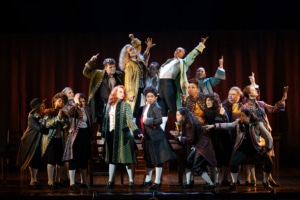
The company of Roundabout Theatre Company’s 1776. Photo by Joan Marcus, 2022
“Jeffrey and I were really clear that we were not interested in presenting an illusion that we’re simply going back in a time warp and watching a re-enactment of history through a glass,” she said. “Yes, you are looking at a historical enactment…but make no mistake: It is an enactment. It’s theater.
“We’re really inviting the audience to hold two realities at the same time as they watch the show. There is the reality of these underrepresented performers today, in their modern dress, and there is the theatrical reality of when those same actors step into the shoes of the Founding Fathers and speak the very words that depict this historical moment of the founding of America.”
At no point is the audience asked to forget who these performers are in their own skin. Instead, “the individual actors are always visible in their authentic identities,” she said. “They never become head-to-toe transformed in their costumes or characters. They still wear the earrings they want to wear and their hairstyle how they want it to be. And, yes, they do enact the play. So for the audience, you’re actually having to think about both realities. I think it makes you hear the language in a fresh, new way.”
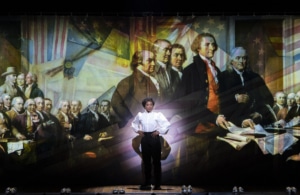
Kristolyn Lloyd in Roundabout Theatre Company’s 1776. Photo by Joan Marcus, 2022
Page, the first African American to be named the Marcus Institute Fellow for Opera Directing at The Juilliard School, believes this new 1776 opens up a conversation around who has the right to this dream we call America.
“It’s interesting because I never really knew what 1776 was, and in the community that I come from, that is not all that far-fetched,” he said. “It might seem alien that an American would have no relationship to what the founding of America means at its very essence. But in many ways, I have felt like the America that people often speak about doesn’t involve me. And so I think this show is interested in commenting very specifically on who gets to have a piece of this American dream – and who does not.”
Paulus is a great believer that theater is an art form that is alive and present, and so she wanted very much to make our present moment of America part of the experience of this production. Theater at its best not only entertains us, Page added, “it awakens us, it shakes us, it disorients us, so that we have the ability to think in ways that are new and bright.
“I think that’s what 1776 does. I’m very proud that this show provokes a kind of discussion that galvanizes an entire community.”
DETAILS
1776
Mar 21-Apr 2 • Buell Theatre
Tickets
